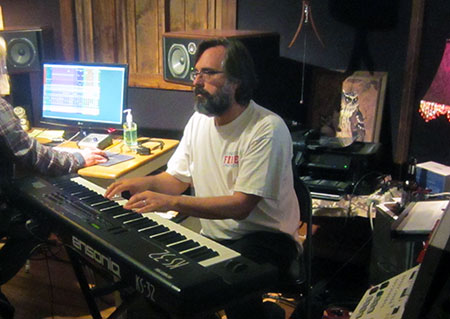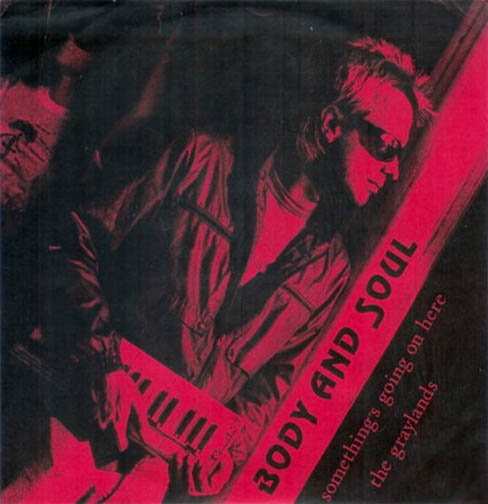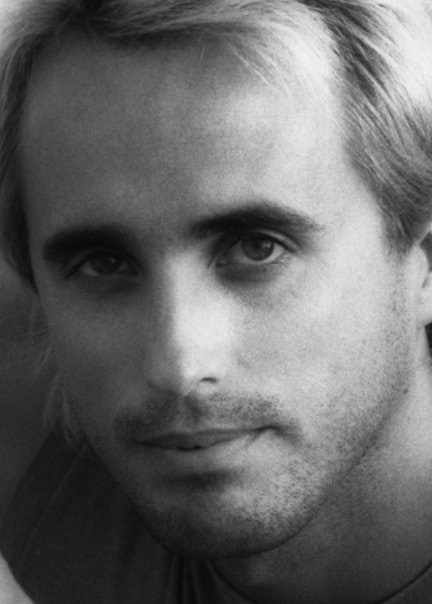Robert Watson, producer and keyboard player, created music on his own both before and after his time in the band Daniel Amos (DA) in the 1980s. Some of this music was released as a single under the band name Body and Soul. A few of these songs eventually made their way to a CD compilation duo: Shirley Goodness and Misery and No Sense of History. The standout of these tracks was “The Graylands,” a moody piece that built up second by second to a gothic crescendo. For all of the terrific songs the compilations catalogued, this was the one that got under the skin the most.

Watson has done much since then, starting with producing Knowledge and Innocence, the first solo album from DA leader Terry Taylor, and performing with DA-offshoot The Swirling Eddies throughout the ’80s and ’90s. He has been a trusted producer throughout, and more recently provided music for Netflix’s revival of Veggie Tales. But what about The Graylands?
Watson now has your answer. On April 29, he launched a Kickstarter campaign to fully realize a complete album of material both old and new. As supports and fans, this was an opportunity MusicTAP could not let pass by, and so we reached out to Watson to ask some questions and to draw attention to The Graylands campaign.

In the discussion, we brought up the long history of “The Graylands,” from Body and Soul to becoming the title cut of Watson’s album; of working the older, analog-recorded material into modern digital audio workstations (DAW); in revisiting recording with friends now passed, bassist Tim Chandler and recording engineer Doug Doyle; and the heady days of DA. For those not in the know, DA was not shy about speaking truth to power, and as a “Christian rock” band, were unafraid of criticizing “blab it and grab it” materialism theology on records like 1982’s Doppelganger. This sometimes came with great controversy and arguments from both sides – the CCM camp that would prefer DA not rock the boat or bite the feeding hand, and the secular side that liked the music but were turned off by any messaging. To quote Vigilantes of Love vocalist Bill Malonee, “You can’t please everyone. Sometimes you can’t please anyone at all.”

Watson defends the band and its membership forthrightly, and gets to hear that older material from an interesting vantage point of a sort of vindication, seeing that while Daniel Amos were making waves, they weren’t wrong. It is this same spirit of veracity to which The Graylands will certainly adhere to.
The Graylands is being “completed” as an album, but I don’t know that it was ever intended as an album. It was on your 45 record (as Body and Soul). Was there ever a plan to have Body and Soul be a full album effort then?
I always intended to complete an album, but I wanted to do it differently. I wanted to release a set of seven inch singles starting with that first single, releasing two songs every couple of months until five or six were finished. Around the time I recorded that single, I started touring with DA in earnest. I was also working as a studio musician as well as touring with Petra, the Sheila Walsh Band, Tonio K., and The Surfaris, and got crazy busy, so I shelved that idea and started to record a more conventional album in between tours. I was spending a lot of time with Tim Chandler and David Raven (Swirling Eddies drummer and noted session man), on and off the road, I played them my demos and they liked them. One day, Tim called me and said that David and he had been working on bass and drums for those songs, and would I like to go to Neverland Studios (run by The Choir’s Derri Daugherty) and record them. I’m eternally grateful to those guys for doing that.
The track was a standout from the compilation it eventually appeared on, No Sense of History. It and the companion Shirley Goodness and Misery had two other Body and Soul tracks: “Locked Away” and “Wall Around My Heart.” Will they also be a part of The Graylands?
The No Sense of History version of “The Graylands” was a different version…quite different from the original release, and is massive and orchestral. It was for that other album I mentioned, that never got off the ground. But in this current project I decided to remix the original because it’s just moodier and fits the lyrics better, in my opinion. “Locked Away” has been remixed, made it on this project, and is sounding great. “Wall…” is currently planned to be one of the songs on the bonus CD for the higher Kickstarter levels, but it might wind up on some future album.
I’m assuming the original recordings were done analog. What was it like bringing them over to a DAW, which I assume you’ve been using for quite a few years now. What struck you about your process now versus then?
All of them except one were recorded on tape. “The Graylands” and “Something’s Going On Here” were recorded on Doug Doyle’s Ampex one-inch 8 track that he bought from I think Warner Brothers Records, the same machine that DA’s Vox Humana was recorded on. Most of the rest were recorded on two inch 24 track machines: Doug’s MCI, which was a converted two inch 16 track. The rest of DA and the Eddies of that period were recorded on that machine, as well as Knowledge and Innocence. Some were recorded at Neverland when it was in Los Alamitos, some when Neverland was at Derri’s dad’s church, and some at Bill Pearson’s Mind’s Eye studio in Temple City.
The newer version of “Graylands” and “Wall Around My Heart” were recorded at Goldmine Studios in Ventura by the amazing Jeff Cowan. The tapes sat neglected in various basements and garages for all these years, and when I went to work for DreamWorks on Veggie Tales in the House I had enough money to spend on baking the tapes (to re-adhere the oxides to the tape film, which separate over time) and transferring them to digital. I love the process of studio recording. It provides a creative structure, planning and pre-production, and deadlines that bring the best out of a team of musicians and engineers. When I sit in my composing room in my pajamas noodling away forever on one song, things tend to drag on. The editing and mixing is fantastic with digital: total recall, multiple mixes to choose from, unlimited signal processing… but if you’re not careful, you can get bogged down in “option overload” – too many choices, too many ways to complete a process. But Kickstarter has provided me another deadline, I have to finish this project!
Tell me about the Kickstarter campaign. It looks like you’re about to meet goal, which is a fantastic accomplishment. Why did you decide to go this route?
Kickstarter and the like are about the only option these days to have any kind of budget. It’s actually fantastic, it gets you in touch with a fan base, helps you focus, and provides a time frame. It’s a bit tricky to predict how much you should shoot for, so I set my goal very low – just enough to pay the bills due of the project – musicians, studios, manufacturing and shipping, but I hope to make enough to press vinyl. If I can’t do that, I’d at least like to have a little bit of seed money to start another project. But I’m happy with it the results so far.
As just mentioned, material from the ’80s will comprise part of The Graylands, but also ’90s material and some new songs. What’s it been like to revisit the material, less from the production side and more from the content side…what struck you most about the songs?
Well, the music, musicianship and arranging startled me with how good it all was. The tapes transferred well, which is a minor miracle because they were sitting in hot and humid environments for years. As far as the lyrics go, some of the things that were important to me at that time aren’t so important now. Some of the uncertainty and angst I was experiencing then is now resolved, but I want to honor the reality of who I was at that time, which was part of the process of figuring out life, so I altered very little.
I improved a lyric on one song that needed a new vocal track, “Changing Me Now,” but only because the vocal I’d originally recorded had too much bleed into the microphone from the speakers and needed to be redone. I must have set the mic up in the control room because I was vocalist and engineer and it was only a scratch vocal. But the improvement made the song even more true to the original sentiment, and I was smart enough to run it by Terry (Taylor)…
You’re also revisiting some tracks featuring folks who are no longer with us. That alone had to be an emotional experience…
Very, very, very much so. I can’t overstate what losing both Doug Doyle and Tim Chandler has done. Everything they touched on this project turned to gold. Their friendship and brotherhood was so deep and crucial, I knew Doug in junior high, and Tim was my room mate most often on tour. Every time I hear what they did on this project I’m rather moved emotionally.
Could you dig into the concepts behind the song “The Graylands,” which I assume references the earthly life, or rather, the life of ambiguity neither here nor there, but somewhere in the middle. I know some musicians hate to psychoanalyze their work, but this one seemed appropriate for deeper dissection…
The song describes three dreams I had when I was in my 20’s, having one each week for three weeks. Each dream and each verse corresponded to the three eras of my life, youth, searching, and maturity, and in them I was experiencing faith in ways that are appropriate to the era, so the song is really about looking for Jesus, and hoping that He’s waiting for me.
As an ongoing member of DA, in many capacities, you were directly involved in a period that likewise was gray. I thought it made for a lot of compelling, challenging work, but I recall that there was always controversy about whether the band was too abstract, not blatant enough about viewpoints, and so on. I wanted to get your take on this. Obviously in hindsight, there’s a lot of respect for DA, but there was at that time a lot of “they’re not enough of this” or “they’re too much of that.” What was it like to be in the middle of it then when the press never seemed satisfied by whatever direction Terry chose to go?
None of that worried me too much. I knew Terry and company quite well, and had experienced them as some of the most Godly and God-fearing men around. I’d been a side man and saw that some people everyone lauded as great Christians had feet of clay and hid it well. The guys in DA got a lot of flack precisely because they were, and are, God-fearing men, true to their faith and honest about life. Pastors and youth ministers are just people with good intentions and are responsible for who they expose their flock to, and are therefore subject to hearing rumors. The rumors I heard were laughably ridiculous and 180 degrees opposite from the truth about the character of DA. But gossip is a deadly virus that spreads and does very real damage to people’s lives and ministries.
You were the producer of Terry’s first solo, Knowledge and Innocence. That was a powerhouse recording, but also deeply emotional and one that I can play for others who have no idea what’s behind the songs, often reducing them to tears (thinking “One More Time” and “Light Princess” here). As the quasi-director of this effort, what was going on in that process? I can’t imagine it was like any ordinary time in the studio, just bashing out ideas.
Albums invariably take on lives of their own. They have personalities that grow as they’re being made, and really good albums tend to “want to be made,” like a child that wants to be born. Sometimes it even seems that all you have to do is follow the path that’s laid out, the album has a way of telling you this, and it’s a real joy.
Knowledge and Innocence was that kind of project, and there was nothing ordinary about making it. Terry and I lived a few blocks from each other, and we’d sit in my little music room on the floor, or on the couch in his living room with my 4 track cassette recorder and make the album demos, and then we went to 3D Studios with my synthesizers and Terry’s guitars. But there was so much deep fellowship and sharing in life, and so many moments in the studio when we’d just create something complex and beautiful, a vocal or instrumental part, without needing to explain to each other – as if we were reading each other’s minds. It was truly memorable.
Thank you, Rob, for sharing the time with MusicTAP. It’s meant a lot.
Thanks for these great questions! I hope people enjoy the album when it’s done, and maybe relate to some of it as they travel their own paths in life.
Robert Watson’s The Graylands is currently a campaign through Kickstarter. You can learn more and make a pledge at: https://www.kickstarter.com/projects/anthropy/the-graylands/description